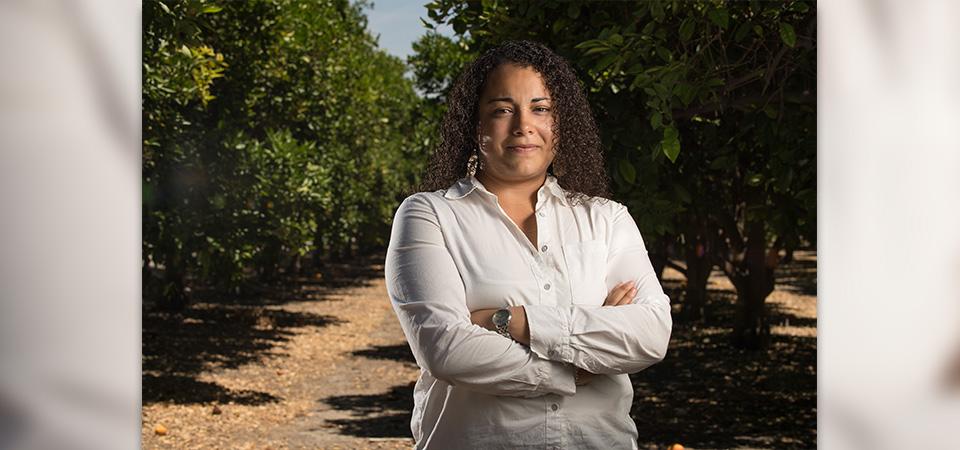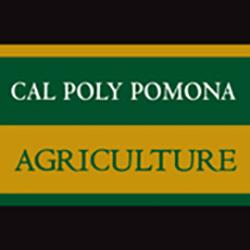Embracing Her Roots in Agriculture
Slideshow
This slideshow contains 1 slides that will change every 8 seconds. The first button is to play and pause the slideshow, followed by buttons to go to the previous slide, next slide, or choose individual slides.
-

Slide1
Fabiola Perez is the first in her family to graduate from college, but her family is firmly rooted in agriculture. She plans to get an MBA or law degree and become an advocate for agricultural interests.

Farming flows in Fabiola Perez’s blood.
Both of her parents’ families have long worked in agriculture. And as a child growing up in Santa Maria, Calif., Perez helped her father work in the strawberry fields and grow sweet corn.
“I love being out in the field,” Perez says. “I know how hard it is to be in the agricultural industry, but I also know how important it is.”
On June 9, Perez will graduate from the Huntley College of Agriculture at Cal Poly Pomona with bachelor’s degrees in plant science, as well as agribusiness and food industry management. She will become the first in her family to graduate from a four-year university.
Perez already has a sales and marketing internship lined up this summer at John Deere in Georgia, but ultimately she wants to become an advocate for agriculture, educating people about just how important the industry is.
‘Born Into It’
Farming didn’t seem to be in Perez’s future initially. She loved sports and played soccer for 15 years, including one at Allen Hancock Community College, and she had planned to study kinesiology and become a physical therapist.
But after working as a student athletic trainer in community college, Perez decided she could not deny her heritage. Her mother’s family had grown agave and other seasonal crops for generations. Her father’s family had also worked in farming.
“I was kind of born into it,” Perez says. “I have very strong ties to it, so I just decided to embrace it.”
Although other universities with ag programs were closer, she transferred to Cal Poly Pomona because she was fascinated that it had an ag program in urban Southern California.
At first, Perez just planned to study agribusiness, but she soon realized that she needed to learn more about the farming side as well, so she added a second major in plant science.
“Plant science is my favorite of the two majors because it is very complex, yet it sounds like an easy major,” she says. “When we are out at [the university’s] Spadra Farm studying invasive plants or crops, there are so many factors that need to be taken into account, such as the weather, water and pests. Many of the factors are often unpredictable, so it makes it difficult to be a farmer.”
Experience and Encouragement
When she is not in class, Perez is gaining field and leadership experience.
For the past two years, she has worked as a paid intern for Nationwide Agribusiness Insurance, visiting farms from Paso Robles and the Central Valley down to San Diego and Imperial counties, performing risk management assessments on agricultural operations.
Perez also works on the Cal Poly Pomona farm crew’s tree team, managing the tree crops at Spadra Farm and throughout the campus.
Among the crops grown at Spadra were sunflowers that were sold as a fundraiser to send Cal Poly Pomona students — including Perez — to the Minorities in Agriculture, Natural Resources and Related Sciences (MANNRS) Conference in Pittsburgh this past March.
She helped found the Diversity in Agriculture Club and MANNRS chapter on campus, serving as its president. Perez also is vice president of the Agriculture Council, the umbrella organization for all student clubs within the college.
Her activities have brought her into contact often with Mary Holz-Clause, dean of the Huntley College of Agriculture, and Valerie Mellano, chair of the plant science and agribusiness and food industry management departments. Perez credits both women as role models and inspirations.
“They are very strong and hard-working women who have accomplished so much and are leaders in the industry,” Perez says. “I have had the great opportunity to learn from them and go after bigger dreams and aspirations.”
Their encouragement and mentorship has helped her get multiple job offers, she says.
Mellano calls Perez a natural leader who draws in people to listen.
“She is very good politically and interacts very professionally with agricultural and political leaders,” Mellano says. “She is also grounded in production agriculture and has excellent field experience. Fabiola will have an impactful career in agriculture in California.”
Future Advocate
Perez will need all those skills and more for her future goal of working as an agriculture advocate. She also plans on getting an MBA or law degree.
Advocacy is important because the public needs to be educated about what agriculture is and does, Perez says. Many people labor under the misconception that agriculture is toxic to the environment or that farming is just growing crops, she says.
“We do not just grow things. Even then, growing crops is not as simple as it may seem. It’s a very complex and strenuous occupation,” Perez says. “In California, we feed the rest of the country, and that is a huge task.”
Agriculture is also about taking care of the land and other natural resources, making sure that they are protected so that future generations can farm it, she says.
Perez already has had some experience in educating the campus community as one of the leaders of the student campaign to protect and preserve Spadra Farm from development. The farm, which is just off campus, serves as a laboratory and classroom for the plant science and agribusiness, food industry management, and agricultural science departments.
She attributes people’s misconceptions about agriculture to media portrayals, which have an effect on the industry.
“That is why we need people advocating for agriculture in the community, and in Sacramento and Washington, D.C. — so that the people get the right information and the truth about agriculture,” she says, “especially before they go out to the polls and vote on laws that can put farmers out of business or increase their burdens unnecessarily.”
